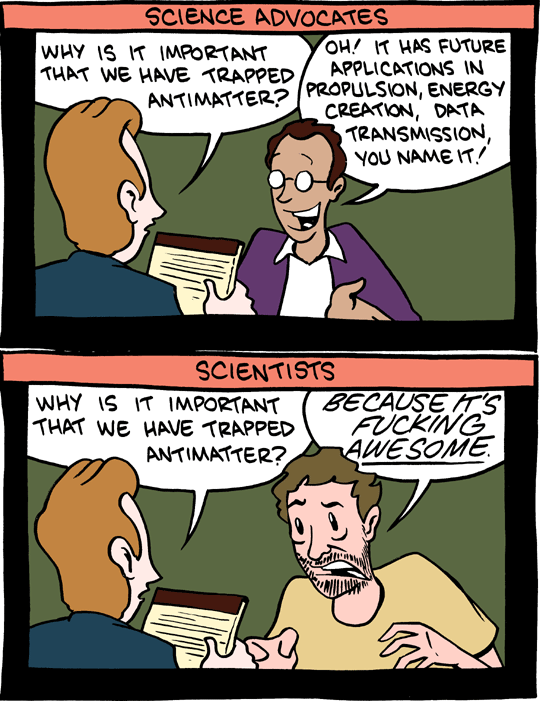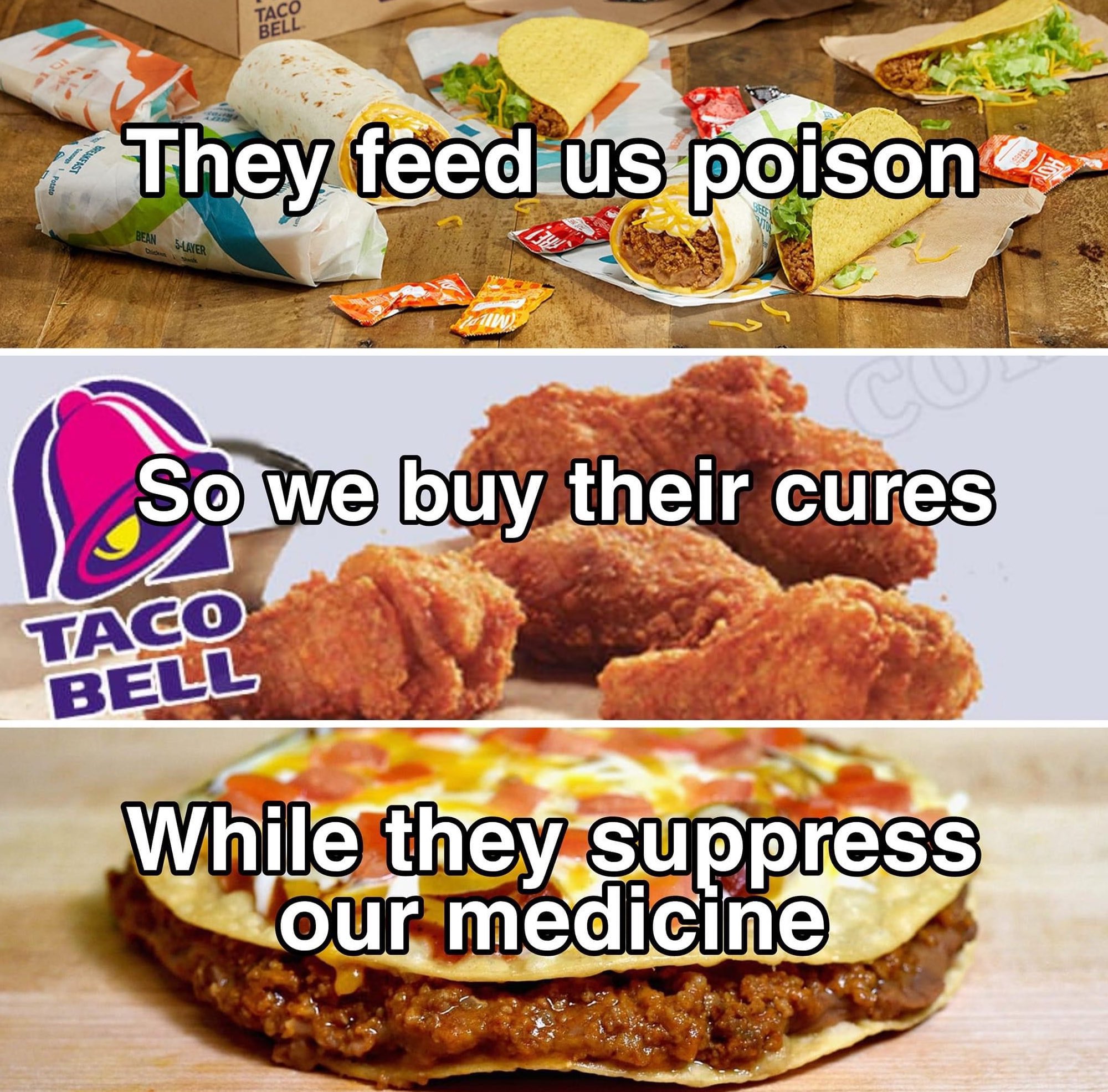If this was as successful as the tweet pretends there would be no stopping it. The profit potential for a successful cancer cure is astronomical.
This is why you dont get informed from a cropped twitter pic on lemmy.
But what if I call it “research” tho?
But I have a source
You’re not wrong, but it is funny because it is accurate nonetheless.
I guess the problem is that a whole lot of people actually believe this is the case.
While we should hold pharmaceutical companies accountable (much more than we currently do), it leads to people not trusting the advice of doctors and healthcare professionals. Other groups then prey on people using those conspiracies to sell bogus treatments and products.
So it might be funny, but it’s much better to call out the conspiracy theories.
Indeed. Real cures don’t disappear, they just get a slight price correction Shkreli- style.
So do you think Steve Jobs just took one for the team or…?
The “it’s a conspiracy why we don’t have a cancer cure” comments make me want to just lay down and drool on my carpet. It’s so fucking retarded it just knocks the brain cells out of me.
deleted by creator
They would if Big Pharma was suppressing a cure, which for the recore, I dont believe is happening.
deleted by creator
Steve Jobs is a bad example, he died of cancer because he refused proper treatment, he could’ve afforded what was available at the time.
What was available at the time was radioactive chemicals injected into the area the cancer was and hoping that it killed the cancer before it killed you. Yeah I get why people would say no to that one.
Steve Jobs died of an easily curable cancer because he refused treatment in favor of eating vegetables.
Yeah, but the kids love it, so……
Sure, it’s just kids that believe this type of retarded nonsense.
Most educated people over the age of 20 know better.
My science teacher thinks that
There is a conspiracy on this. Pharma companies aren’t interested in curing cancer because it would rob them of many millions of life long “customers” who are reliant on their products. The majority of their R&D budget goes into specific treatments of symptoms, or treatments focused on specific types of cancer rather than a fundamental cure. Universities and charities do the research into the cure but they’re nowhere near as well funded. This is a pretty well-documented fact, sadly.
It’s not exactly unbelievable either, given the behaviour of other corporations like Nestlé, Shell, BP etc.
Edit: Huh this turns out to be quite controversial. I remain unconvinced by your arguments. Just for the record, I’m not a conspiracist, but I do believe there are conspiracies, and I believe this is one of them. It’s a mundane one, a lot like the conspiracy to keep everyone burning planet-killing fossil fuels or lung-destroying cigarettes.
It’s been…Reddit, talking with you.It is actually quite easy to see if something is a conspiracy.
Just ask yourself: do the rich and powerful suffer from it?
If the answer is yes, then it is bollocks.
For example, have rich and powerful people died of cancer? They are the ones who could get any treatment they want, even the conspired against ones.
Yet there are plenty of rich people suffering from cancer.
Another easy one would be chemtrails. The rich and powerful live under the same sky as everyone else. So if someone was doing that, you know they would throw money against it to stop it.
Except that it seems like some rich people live in some parallel universe because they seem not to care about the environmental harm.
Why should they when they can pay to not get harmed by it?
I thought about it, depends on the scale of how fucked up everything will get
deleted by creator
It’s utter nonsense. R&D on treatment is generally a safer investment than a full cure that may not pan out at all.
But think of it like this: the first company that does cure cancer will easily out-compete other pharmaceutical companies. That’s why we do in fact have cures for a variety of cancer types.
And it’s not like people will stop getting cancer once a cure is found. You can keep selling the cure you can patent! That would push any other pharma company that only focuses on treatment out of the market immediately.
I really hope the first company to cure cancer does like Volvo did with the 3 point seatbelt & says “hey, this is really important-- everyone do this!”
Its more complicated than that. Cancer exists in everyone and has millions of variants. The question does it mastesize or is it benign? Where is it? Is it just some lump on your arm at 95? Or on your heart at 35? There are many factors.
The focus of research should be on telomere therapy, because that’s the most likely area to develop an all-cure. Yet it receives a fraction of the budget other therapies receive. Most telomere research is funded by grants from charities or public funds. I couldn’t find any research funded by private bodies (which isn’t to say there is none).
Look, if people could get a jab that vaccinated them against cancer, the companies selling the current myriad treatments, often lifelong, would stand to lose a huge chunk of their income. I don’t think that’s in any way magical thinking. The next premise is that the divvying up of R&D funding will therefore never be in favour of an easy, outright cure, because the people who make those decisions aren’t doctors or cancer patients, and their role is purely to increase the value of the company, over the short and long term. Yes, the first company to do it would destroy the profits of any competitors, but it would reduce its own in the process.
So we have: 1: a one-time vaccination or other easy therapy to prevent or cure cancer wouldn’t be in the interests of any company making lots of money off a vast treatment range, and
2: the people who allocate funding aren’t going to research the treatment in 1) out of the goodness of their hearts. The outcome is a much slower general progression towards a cancer cure than is ideal. It does amount to a conspiracy, but only because of the pressures of the free market. It’s the same kind of mass stupidity the human race displays when it comes to climate change.
I’m honestly interested to see if you refute either of the two points above, or their link/outcome. I genuinely would love to be wrong about this.Look, if people could get a jab that vaccinated them against cancer, the companies selling the current myriad treatments, often lifelong, would stand to lose a huge chunk of their income.
Also- https://en.wikipedia.org/wiki/HPV_vaccine
Are you going to tell me Merck lost a huge chunk of their income when they developed Gardasil?
No, obviously not. What I’m saying is a universal cure for cancer would do that. I thought I’d made that clear, sorry.
That is not possible. Cancer is not one disease, it’s an umbrella term for a huge range of diseases. What you’re talking about is like a vaccine for all types of virus. Things don’t work that way.
I mean thanks, but I don’t think you’ve got that right. It’s a runaway mutation. Stopping all runaway mutations is hypothetically possible.
Saying it’s impossible is loser talk.
Nope, while telomers and general aging are important. It has nothing or little to do with most diseases. You say the people making decision are not cancer patients. That is not really true. 20 % of the population die of cancer. 1/5 of the pharma management dies of cancer, 1/5 of the spouses of these people die of cancer. 1/5 of the children of these people die of cancer. It is in the direct egoistic interest of these people to find cancer cures.
Ok, so if the people making the decision were all patients or the relatives of patients, and they were also just regular people with normal working class jobs, do you think the amount of money put into research would increase or decrease?
I don’t know, many societies don’t want to discuss how much worth is one additional year of life for example. I also don’t know if it would improve output if research and development and manufacturing of drugs would be completely state run. But the I think the ruling elites are almost all patients in one form or the other. Have you ever seen a completely healthy elderly politician? If it only taking pills against high blood pressure, or high cholesterol. Or maybe they have a new hip or knee joint.
Point 1 is easy: yes a single company might care more about treatment over prevention, but there exist more than one company. The first to develop the cure easily outcompetes all the others. And this is demonstrably true, since we have tons of vaccines for all kinds of illnesses. Ergo, it is in companies’ best interest to develop cures, so they can remain competitive.
Point 2 is also a bit silly. Tons of medicinal research is done using donated funds. There are a lot of researchers working on cancer cures. But “cancer” is a very broad category of disease, there will never be a single cure. Instead we focus on cures and treatments of specific types of cancer, and we do find cures every now and then.
W.r.t. telomere research, it’s certainly interesting but the link between telomeres and cancer/aging is all still fairly weak. There’s not much evidence anything there actually works. That’s also why funding in that area is lacking; more promising fields are being explored instead.
I think you’re missing the point: any company making lots of money off cancer therapies will lose out after a cure behind available. That’s point 1. Then point 2 is a point about how large corporations work, i.e. they will not do something against their own financial interests, even if it is in the interests of everyone, cf. weapons manufacturers and oil drillers.
If you accept these, then a possible outcome is that there’s no corporate interest in curing cancer once and for all.You’re missing that in a free market, companies will try to compete with one another. Strictly focusing on treatment is far too risky an endevour if another company is working on a cure.
It’s all risk-reward. A company with a cure is certain customers will come to them, as anyone would pick a cure over treatment. Additionally, they can ask for a high price: it’s your only option to be cured after all! So therefore, a cure is low-risk high-reward. Exactly what investors like. It’s also why there is a lot of research going into curing cancer, which disproves your hypothesis.
If company A does treatments but company B cures, then B stands to make a lot of money and A sees their revenue stream cut off overnight. This means that in order to remain competitive, A must also research a cure. It’s in their financial interest, as it is the only guaranteed way to keep making money.
The reason we don’t have an amazing cure for all cancers yet is because cancer is difficult to cure, not because there isn’t any funding. We’ve already cured a couple types of cancer, but no one cancer is exactly the same.
Yeah this is just utter bullshit. My prove are cures like Sovaldi/ Harmony, Zolgensma, Hemgenix and many more which will come in future. You can complain that these treatments are ridiculously overpriced. But obviously as a company you take the 1-2 million Dollar now instead of some unknown revenue in the decades ahead.
Entirely wrong, but fun read nonetheless.
I’d guess this is what happened:

This comic has more panels but for some reason i can’t upload the full version so here’s a Link to SMBC Comics
Yep, and even more it’s
We’ve destroyed 10 percent of a specific variant of a specific type of cancer in a lab rat’s tail
Saying there’s a cure for cancer is like saying there’s a cure for all “respiratory infection diseases”.
Or even
We’ve destroyed 10 percent of a specific variant of a specific type of cancer in a lab rat’s tail that was removed from the lab rat’s tail and grown in an artificial environment allowing simplistic vectoring methods to apply our solution to the cells.
I love SMBC, but finding the damn comic I’m wanting to link can be enraging.
I feel for you, it’s a pain every time I want to show someone a panel about why we need to do things

Some statistics:
The prognosis for a disease with a treatment that’s regular enough to be more profitable than a cure over time, but doesn’t cure the underlying disease (or send it into remission), is typically measured in months. For glioblastoma in particular, that average is 12-18 months.
You’re not talking about bilking people out of treatment for decades, you’re talking about getting maybe a year. Even the most misanthropic pharmaceutical executive (and let’s be honest, they all are) would look at that calculation and say “nah, if we can cure it, we can charge way more and people will pay it. People will pay just about anything for a cure.”
This is why cancer remission rates have gone up by 30% or more in the past fifty years. It’s just way more lucrative to cure a disease than to try to keep people alive, but not cured. That tightrope is just too thin for them to walk reliably and make any profit.
Plus, if you’re the first pharma company to release a straight up cure, your market valuation is going to go through the roof.
It’s such a bizarre claim. A close friend of mine had testicular cancer in his 30s. He had chemo and surgery and there has been no reappearance of cancer over 10 years later. He isn’t on pharmaceuticals for life. The cancer is essentially cured. Based on this conspiracy theory, chemotherapy would have been suppressed.
Awesome! That’s so great for him. And yes, chemo (and surgery and radiation) are more and more becoming silver bullets that either solve the problem “immediately,” or don’t work and transition directly into palliative care.
There’s a lot of sketchy stuff in pharmaceuticals, so it’s kind of odd to me that this one thing that’s patently untrue if you just think about it for a minute is what’s caught on.
yeah, this theory that they “wanna keep us sick so we keep buying symptomatic treatments” ignores the fact that while the industry as a whole might lose a little bit, the company that gets to patent THE CURE FOR FUCKING BRAIN CANCER and then charge whatever they want for it is going to make an assload of money. It starts with the assumption that pharma CEOs are evil, but it doesn’t follow through with that assumption. Instead it ends up in a place where pharma CEOs are happy to split a couple billion dollars a year amongst themselves when a cure, should they find it, will end in them getting trillions are for themselves. Everyone knows they want to make as much money as possible, and they’re proudly open about that fact. So it rationally follows that they’d pursue a cure and make much, much, much, much more money all for themselves than suppressing a cure and making less money total split over many heads.
Exactly right. By all means, go after Big Pharma for the price-fixing, the collusion with insurance companies, the lobbying, the anti-competitive practices, the insufficient research dollars, the monopolistic practices (I could go on)–don’t waste your time on this nothingburger.

“They said it typically takes 10 to 15 years for a new drug to get from the lab to the patient. The team at the University of Findlay is on year two.” In 2019
So, still some time to see if it truly was dissappeared or just didn’t make the cut.
Yeah, but don’t let that get in the way of a good ol’ fashioned fist shaking for the kids.
“They have also refined it to ignore healthy brain tissue and focus on the cancer cells.”
Uh, I feel like that should’ve already been covered by the first sentence. Kind of a weird “clarification” to make, and now I’m more worried about its effect on healthy brain tissue than without saying that part.
it’s not that strange, chemotherapy for example kills a lot of things that are not cancer
when my gram decided not to do chemo the hospice nurse basically explained to me that chemo is like your body playing a game of chicken against the cancer. basically making itself a really hostile place for anything that’s trying to grow rapidly and hoping that the cancer is destroyed before the rest of you.
They’re being a little oddly vague. It’s all about the amounts of each that they kill. Bleach cures cancer, it just kills the patient too. And there’s no such thing as “refining” something that used to kill healthy cells so that it doesn’t ever anymore. Maybe they found a variation of the chemical that is strongly biased towards killing cancerous cells but unless that was their targeting mechanism the whole time, they’re going to be killing some healthy cells too.
Ya I’m refining my bullet in the brain technique which is known to stop cancer cell growth within just MINUTES. I just need to refine it to ignore healthy brain tissue.
Bleach, guns, and flamethrowers also kill cancer cells. Killing cancer cells is easy. The challenge is killing cancer cells but not the very similar-looking healthy cells.
My cousin, 15 at the time, died from a rare form of glioblastoma. It wrecked my aunt’s family.
They have also refined it to ignore healthy brain tissue
Before they added this feature, it had both a 100% cure rate and a 100% mortality rate.
task failed successfully
i mean yeah it will suddenly stop existing in a few months, but that won’t be because of a conspiracy, it’ll be because another lab tried it and found out it didn’t actually work as well as the scientists had optimistically claimed. remember that Taiwanese lab that claimed to have room temperature semiconductors, and then everybody was like “holy shit this is incredible”, and then everybody else tried to make it and was like “this, um, isn’t a superconductor” and the original Taiwanese lab was like “shit our bad nvm”
Image Transcription: Twitter Posts
Jon Monk, @JonWTOL
Students at @ufindlay college of pharmacy have developed a chemical compound that kills gliobastoma (brain cancer) cells.
They have also refined it to ignore healthy brain tissue and focus on the cancer cells.
[Two photos are shown. The first is an upper body view of two people in a lab with lab coats. The second is a closeup image showing a vial of a substance in one of their hands.]
frank, @frankieeg86
make this go viral before it suddenly doesn’t exist
Don’t worry. Big pharma will buy the patents and kill any further development
Because they hate money
Because continuous treatment is much more profitable than a cure.
We’re talking about glioblastoma here, there’s not much “continous” treatment to be had and temozolomide’s and bevacizumab’s patents have run out (edit: also bevacizumab doesn’t prolong overall survival at all and temozolomide is ineffective in MGMT-positive patients, i.e. about half).
That said, I’m not sure why the other commenter is so dismissive of your idea. There’s plenty of drugs that have been kept in the cupboard (e.g. desloratadine) or not seeking approval for certain illnesses so a “new”, more expensive drug could be sold (e.g. no rituximab trials for multiple sclerosis so Roche could sell Ocrelizumab, no Bevacizumab trials for macular degeneration so they could sell Ranibizumab) – and certainly many more that we never heard about.
That’s just not true, and it’s been shown over and over again.
The prognosis for a disease treatment that’s regular enough to be more profitable than a cure over time, but doesn’t cure the underlying disease (or send it into remission), is typically measured in months. For glioblastoma in particular, that average is 12-18 months.
You’re not talking about bilking people out of treatment for decades, you’re talking about getting maybe a year. Even the most misanthropic pharmaceutical executive (and let’s be honest, they all are) would look at that calculation and say “nah, if we can cure it, we can charge way more and people will pay it. People will pay just about anything for a cure.”
This is why cancer remission rates have gone up by 30% or more in the past fifty years. It’s just way more lucrative to cure a disease than to try to keep people alive, but not cured. That tightrope is just too thin for them to walk reliably and make any profit.
This is a huge assumption. If this actually cures glioblastoma they could charge whatever they wanted
And their stock price would skyrocket. It would make a lot of very rich people much richer, which they’re generally in favor of.
Cancer is infecting people all the time. Curing every person right now would not stop it from reappearing.
A cure would be like an infinite money glitch.
Maybe if you’re shit at marketing.
Meanwhile I can already see the advert writers salivating at getting to walk past the regulators and openly advertise “we cured cancer!”
And it’s also fun to add side effects. Oh! Let’s do diarrhea and uncontrollable flatulence on this one!
Let’s see… I have diarrhea and I fart a lot or I die in agony of cancer.
Yep, definitely going to pick the cancer. For sure.
No, they’d buy the patents, make a product out of the IP, and then charge an astronomical amount for the treatment. It’s their playbook
But if the conspiracy is that obvious, it doesn’t make me feel like a special sleuth who’s smarter than all the sheep! I like getting feelings of superiority from watching 5-minute YouTube videos. Why are you so closed minded?
The rich and powerful could easily get their hands on that if that were true.
Yet there are plenty of them that die of cancer every year.
That is the joke















